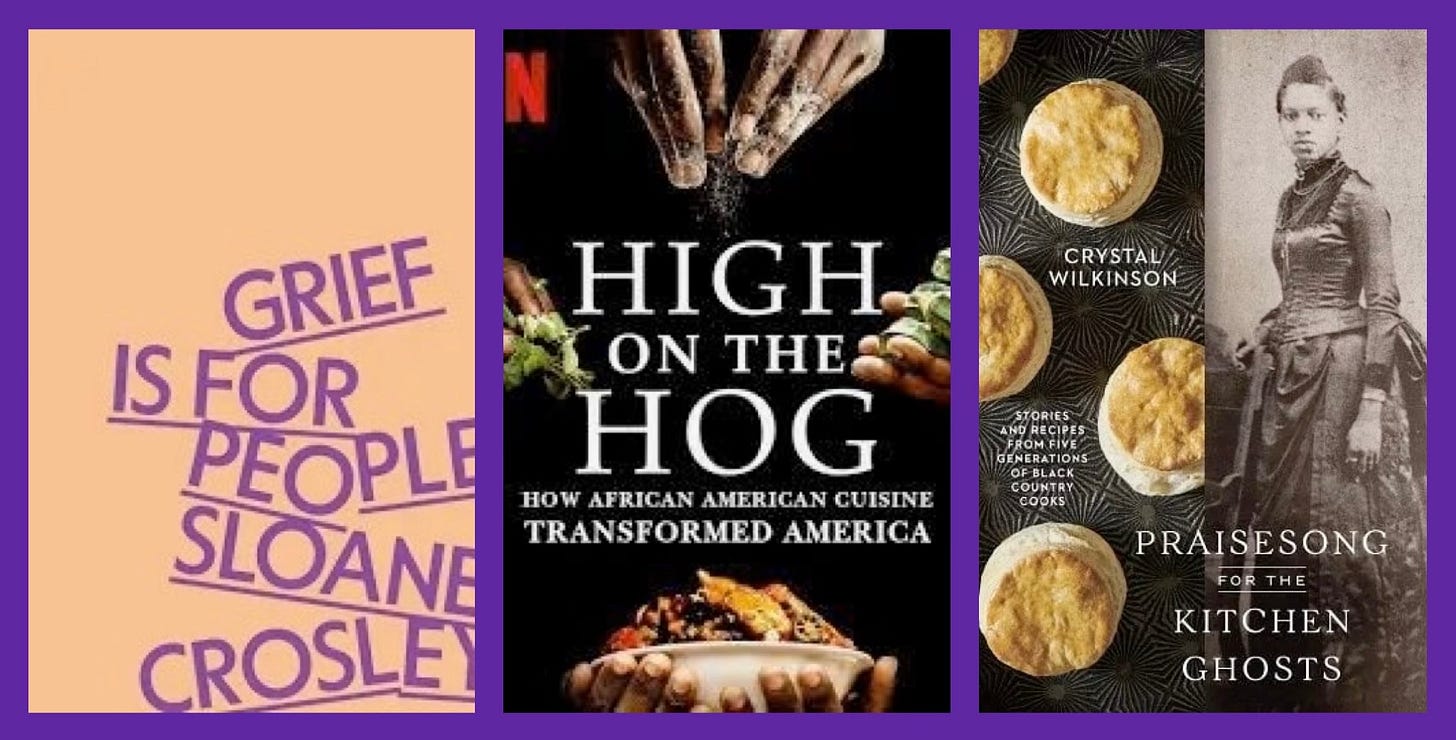The Longest Shortest Month Gets More Recommendations
Leap Year, when I think about time being a social construct - an extra 24 hours?! Every four years?!
BOOK: Grief is for People by Sloane Crosley: This short but impactful reflection on grief by Sloane Crosley, who faced the grief of losing family jewelry (to a burglary) and the grief of losing a loved one (to suicide) within the same month, is about her reactions, feelings, thoughts, and interactions with the world in the days, weeks, months and years after her losses. I’ve read a lot about grief the past two years to make sense of my own, but this was one of the most honest and reflective and useful for me, because it captured my all-over-the-place thoughts, feelings and emotions.
”Maybe I can put mine in a cabinet. But the drawers keep popping open. The grief does not cotton to being squished. It takes the form of painful blooms in the chest that require attention, often in public. I stop in the street, putting my hand over my heart like I’ve just remembered something. Or else I sit on planes with tears streaming down my face.” - Sloane Crosley, Grief is For People
I am glad more people are sharing publicly about grief, the different kinds of grief, and that it is not “over” at a certain point. I’m even more grateful that my own friends were open to me about grief before I had to face the worst of it so I wasn’t surprised by how it shows up, disappears, and shows up again. It doesn’t make it easier, it’s just more honest. Also FOREVER grateful that they all told me the “five stages of grief” is BULLSHIT (it was created as the five stages of coming to terms with DYING, and popular psychology has just run with it for grief. I get it. Who wouldn’t want to know that after this horrible sadness, it will be OVER after this five stage linear path). Anyway, read this book.
BOOK: Praisesong for the Kitchen Ghosts: Stories and Recipes from Five Generations of Black Country Cooks by Crystal Wilkinson. I don’t cook, but I love good food, and I love history of food-ways. I know there are memes about all the stories in recipes but since I don’t cook, I loved these stories that the author writes about her family and the food they grew and cooked, and her imaginings of what her ancestors would say about the food. And she includes key recipes too!
The author was vegetarian for a while so she also includes options for making things without ham hocks, chicken broth, etc.
TV: High on the Hog: How African American Cuisine Transformed America (2 seasons Netflix): I was happy to finally watch Season 2 of High on the Hog. Season 1 of this informative, mouth-watering, and joyful documentary series aired in 2021 and was one of my favorites that year. Season 1 gave me lots of facts about one of my favorite foods - Macaroni and Cheese! The story of this dish is bursting with ALL the threads of the US History. James Hemings, enslaved chef for Thomas Jefferson, also the brother of Sally Hemings, was trained as a Chef while Jefferson was in France, and created such a well loved recipe for what was then called Macaroni Pie that Jefferson hoarded cheese at Monticello. We know this because Jefferson liked to carefully track how he spent all his money and exactly where his inventory was (in cheese as well as in enslaved people and property).
Season 2 expands by tracking Black American food-ways through the great migration to Harlem, New Orleans, Atlanta, Chicago and more. Each season is bursting with excellent history, storytelling, great food, and doesn’t shy away from from the actual history of the US from the Trans-Atlantic slave trade, to Native American Genocide to Jim Crow, the Great Migration and Civil Rights movement — all in connection to food that we love.
And in a full circle moment, I learned from reading Praisesong for Kitchen Ghosts that the term “High on the Hog” came to mean “well off” or “extravagent” because it alludes to the most expensive cuts of the Hog, which are ABOVE the belly.
MUSIC: Black Artists in Country Music: A few weeks ago on Super Bowl Sunday, Beyoncé teased a new album by dropping two new country singles Texas Hold ‘Em, which last week became the first song by a Black Woman to debut at No.1 on the country charts, and 16 Carriages which debuted at No. 9. These are NOT her first country songs; her first, Daddy Lessons, was my favorite single from Lemonade. But SOME people refused to list it on the country charts back then, and SOME people were ornery when she and the Chicks performed it at the CMAs. Because of the attention that Beyoncé brings, Black artists in Country music are having a moment…to people who don’t know the history of country music, and/or to people who dismiss and look down on Countrt music for so many reasons (regional bias, assumption that it’s all red state rednecks, class bias, and more).
This moment is an opportunity to share actual country music history and extend the spotlight on amazing artists that have been working in these genres, from shaping it generations ago to the current stars. Beyoncé, a Houston native, is one of many artists inspired and shaped by this genre.
You must watch my go-to Sociologist and culture critic Tressie McMillan Cottom’s response to these songs and this moment. The first question on the reel below is also about Beyoncé’s extra platinum blonde hair, another subject which Cottom has turned her brilliance towards.
As I shared in one of my 2023 End of Year Recommendations, Cottom’s work on Black artists in Country, Folk, Roots and Americana comes in three seminal articles: The Black Vanguard in White Utopias and How Brittney Spencer, Joy Oladokun, and Other Black Women Musicians Are Reframing Country Music, and The Dolly Moment: Why We Stan a Post-Racism Queen. I read the articles, then listened to her playlists, continued listening to each artist’s work individually, and now the algorithms are working for good and not evil, and giving me more artists to enjoy. I have a deeper understanding of the history of it all, and the FACT of a thing called RACE RECORDS — the categories of race records (eventually became R&B) and hillbilly music (eventually became Country) were CREATED by record companies on explicitly racial and segregationist grounds. If you want a short intro, I recommend this podcast Cottom did with another fav of mine Sam Sanders, just last year
The history and the business of Country music is, like all things, a mirror to society. The stories we share, the stories we don’t, and how we use the stories to build and hold power.
I humbly share my current Black Country/Folk/Americana/Roots playlist. I also have been exposed to so many other artists (women, Chicano, Latinx, Indigenous) who also sing in these genres that I love, and aren’t tied into the extra-jingoistic lyrics that has become the norm for the past 30 years in Country music specifically, and I’ll hopefully share those in the future. Feel free to share other suggestions in the comments for me to explore.









